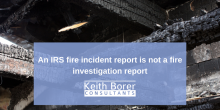
July 09 2020

Arson is an offence which falls under the Criminal Damage Act 1971 in England and Wales, and the Criminal Damage (Northern Ireland Order) 1977. Scotland uses the similar charge of wilful fire-raising, contrary to Common Law.
Conviction can result in a custodial sentence with a maximum sentence of life imprisonment. Clearly, an arson or wilful fire-raising charge has potentially considerable consequences for a defendant. As such, it demands appropriate evidence to ensure the basis of a conviction is sound.
The basis of proper fire investigation
The evidence should include a fire investigation report founded on a methodical examination of a fire scene, by a suitably qualified expert. This report should be supported by meticulous and comprehensive records and photographs which demonstrate scientific testing of hypotheses of where and how a fire could have started. This approach has long been taught, such as the UK’s publication “Principles of Fire Investigation”[1] and the USA’s publication NFPA 921[2]. The recent creation of the Code of Practice for Investigators of Fires and Explosions for the Criminal Justice Systems in the UK[3] reinforces these requirements.
What is an IRS fire incident report?
Despite the availability of reference documents and the launch of the Fire Investigation Code of Practice in 2017, KBC still encounters examples where the only evidence relating to fire cause is a fire incident report from the fire and rescue service 'incident recording system' (IRS)[4]. Fire and rescue service websites highlight the fact that information on this system is collated mainly for statistical purposes, as determined by the requirements of the Home Office. An 'incident report' is completed after the fire service attends an incident. It covers fires, false alarms and non-fire incidents. It will include basic details about the incident, such as where the fire took place, the time the fire service was notified and what the fire service believes to be the ‘most likely’ cause of the incident. What it is not is a detailed fire investigation report suitable for use in a criminal trial. It is neither a scientific nor an expert report and should not be considered such.
Missing evidence and expertise
One example of the use of an IRS report to support an arson charge involved an allegation that petrol had been strewn around a domestic garage and that the defendant had then ignited a cigarette lighter. No trained and competent investigator had undertaken a proper scene examination. No scene photographs were produced, no scene examination notes were offered, no Crime Scene Examiner’s report was prepared, and no Fire Investigation report was compiled. No samples were taken from the scene to demonstrate the presence of petrol and no record of any damage to the garage or contents was presented. The sole ‘expert’ evidence was the IRS report. The lack of scientific work carried out by the Prosecution at the time of the alleged incident rendered it impossible for the Defence to undertake their own consideration of the evidence. This falls dramatically short of what is accepted as a minimum standard set out in the Fire Investigation Code of Practice.
Fire investigation is a discipline requiring highly complex and technical expertise. Despite this, cases are being brought to trial in the absence of underlying data that is expected and essential in order to support expert opinion. If you have a fire case, it is worth checking whether the scene has been documented, whether evidence collected has been examined appropriately, whether the opinions are properly supported and whether alternative hypotheses have been considered.
Fire investigation experts
Keith Borer Consultants has a team of three proficient fire investigators who routinely assess fire origin, cause and factors involving fire movement and spread, including risk to life. They are instructed by both the prosecution and defence, to consider cases ranging from small, single item fires to multi-million-pound loss fires and multi-fatality fires. If you wish to discuss a case, please contact Jennefer Gray, Alan Henderson or Dr David Schudel on 0191 332 4999 or email kbc@keithborer.co.uk.
[1] Cooke and Ide, first published by the Institution of Fire Engineers, 1985
[2] National Fire Protection Association 921 Guide for Fire and Explosion Investigations, 1995 and revised around every 3 years (current edition 2017)
[3] Code of Practice for Investigators of Fires and Explosions for the Criminal Justice Systems in the UK (2017). Jointly endorsed by the Chief Fire Officer’s Association, the Institution of Fire Engineers and the UK Association of Fire Investigators.